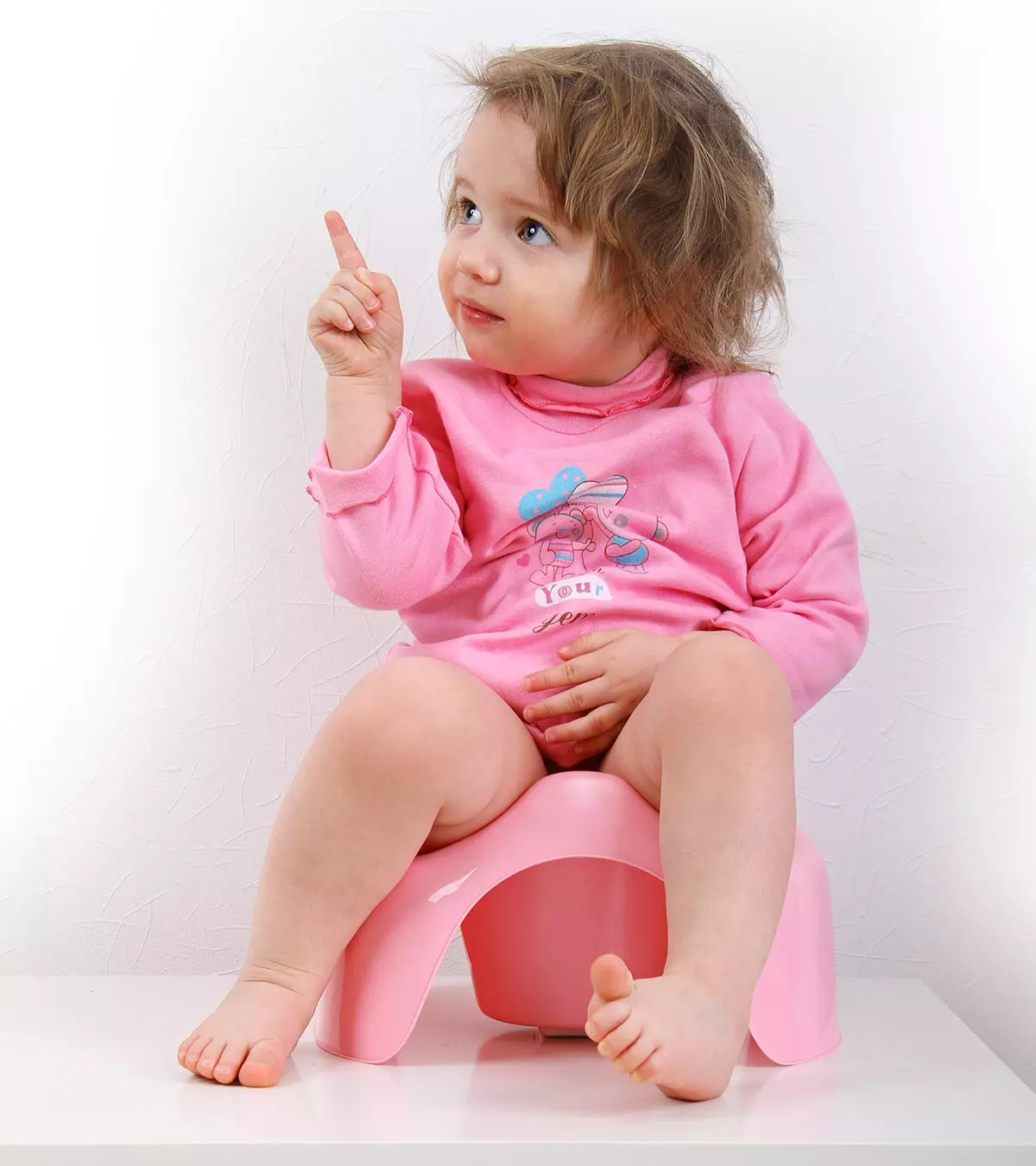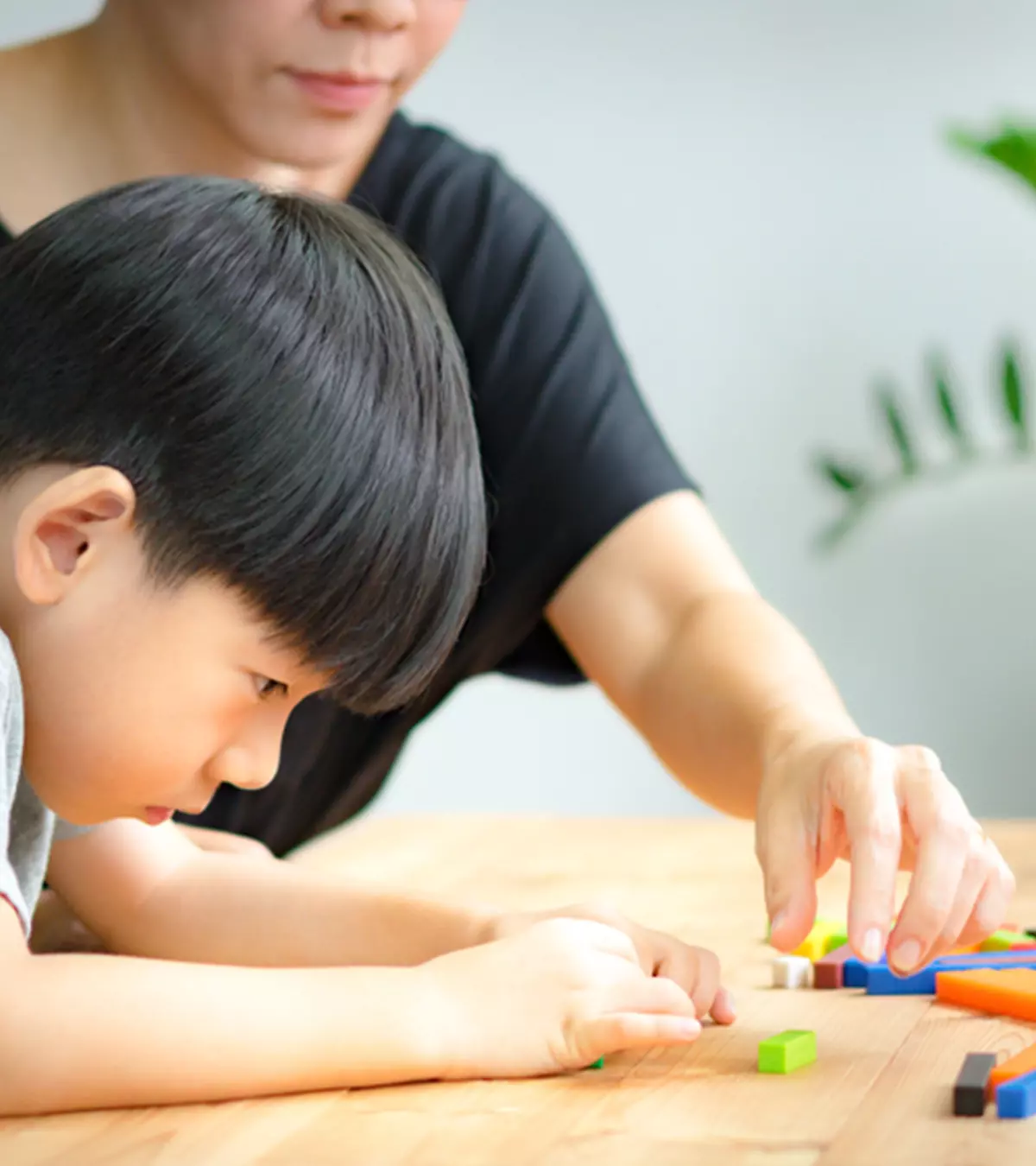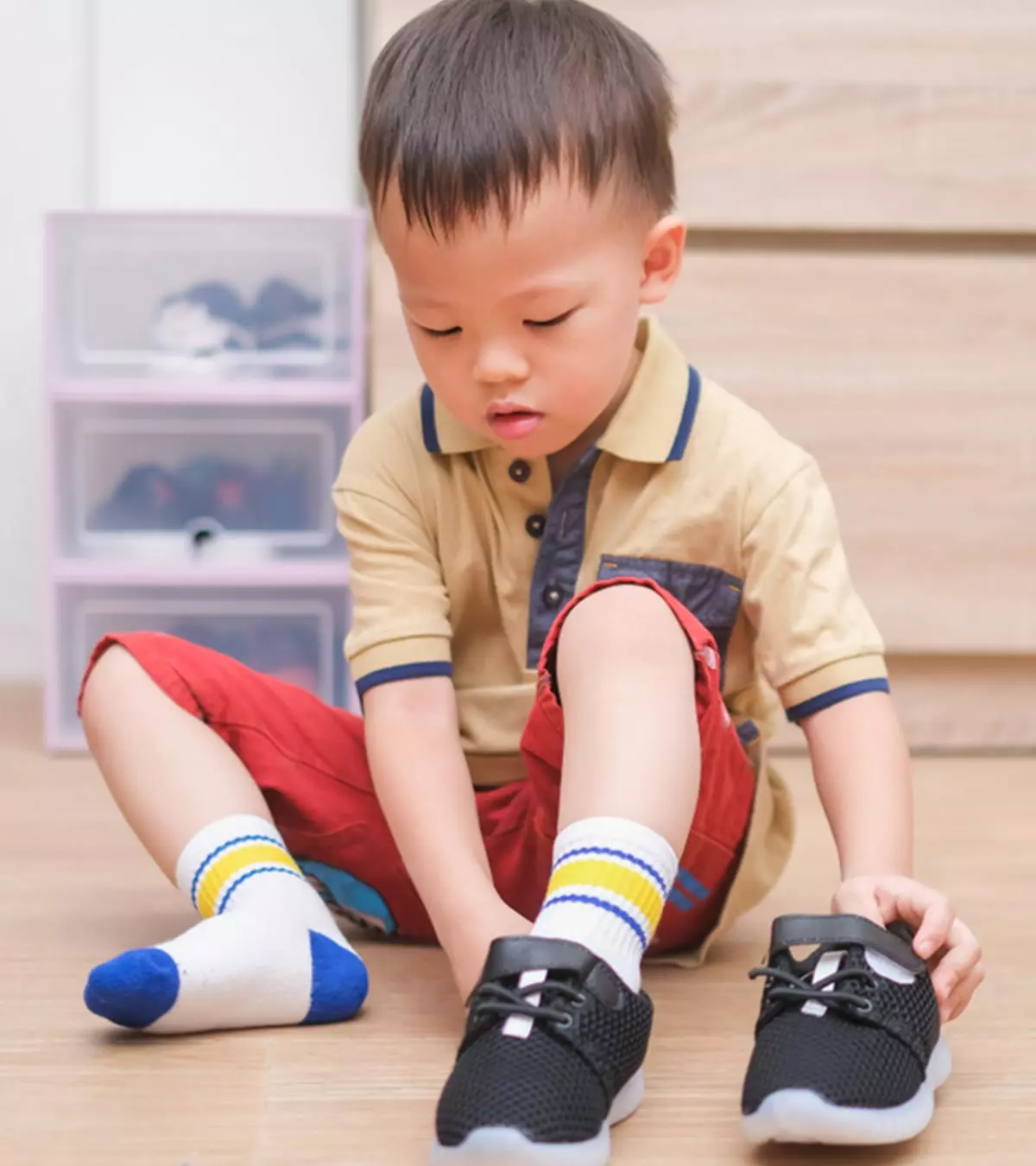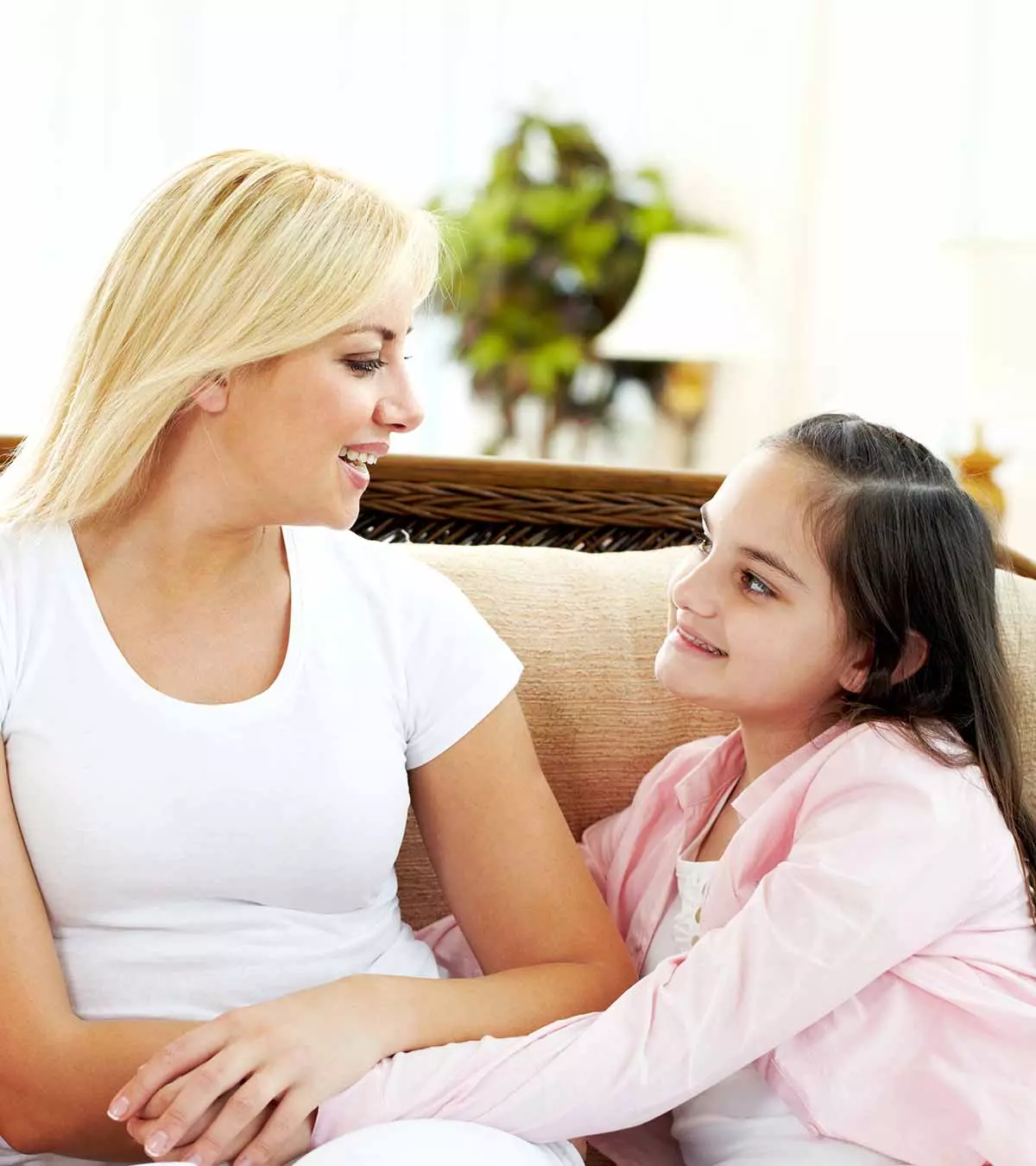
Image: ShutterStock
A child’s behavior keeps changing as they grow. Some children tend to be moody and display difficult, sulky behavior as they grow older, leaving the parents wondering how they can deal with their sulking child. Usually, children may express that they are upset, discontented, or dissatisfied by sulking, glaring with anger, and groaning. Implementing some easy yet effective parenting tricks could help comprehend the problems your child could be experiencing. We share some practical tips to help keep your child relaxed and prevent them from sulking. Read on to know how to deal with a sulking child.
Key Pointers
- Parents can find it difficult to handle persistent tantrums and arrogant attitudes of their children.
- Effective strategies to cope with a sulking child include spending quality time with them, creating a safe and happy home environment, and encouraging them to communicate their difficulties.
- Parents should avoid setting high expectations, displaying harsh conduct, or showing extreme agitation towards their child.
- It is important to encourage children to strike a healthy balance between learning and playing time, and ensure they get adequate nutrition.
What Is Sulking Behavior In Children?
Sulking in children is a form of passive-aggressive behavior where they express dissatisfaction or frustration through non-verbal cues like pouting, withdrawal, avoiding eye contact, and being sullen. When this happens, it is usually because they feel like they have no control over what is happening and they are expressing their feelings of hurt, anger, or disappointment without using words. However, looking on the bright side of things, sulking is not a measurement of their overall behavior and when it happens, it does not last for long periods.
Why Do Children Sulk?
Children often sulk by whining and pouting to express their displeasure, anger, or frustration towards a situation or someone. There are various reasons why children sulk.
- Limited emotional vocabulary
One of the most obvious and common reasons is that children often are not able to articulate the right words to express complex emotions, leading them to sulk instead.
- Fear of repercussions
Depending on the environment or people around them, children may fear that expressing themselves or talking about their feelings may evoke negative or harsh responses from adults or caretakers. To avoid this unpleasant scenario, children often stick to sulking as a safer alternative.
- Attention-seeking
Sulking can be a strategy to gain attention from parents or caregivers, even if it is negative.
- Manipulation
Children are highly observant and pick up on cues that work in their favor or against them. When children learn that sulking can help them get what they want, such as avoiding chores or gaining privileges, they use it to manipulate situations to their advantage. Sometimes, manipulative children may do this unconsciously.
- Lack of emotional awareness
Children are not at a stage where they are emotionally mature and aware of the consequences of their actions. Many children do not understand how to express their negative emotions because they lack emotional awareness. Teenagers may also lack emotional intelligence. Instead of talking about their feelings, they might sulk.
- Change in routine or environment
Disruptions in a child’s routine or environment can cause stress and lead to sulking behavior. When children face unexpected changes and unfamiliar surroundings, they struggle to adjust and regain a sense of comfort and security. This can manifest as withdrawal, irritability, or sulking.
14 Helpful Tips To Deal With A Sulking Child
It might get difficult for parents or caregivers to handle a sulking child. However, we have a few tips to help you deal with a sulking child effectively.
1. Spend quality time in nurturing your child

Image: Shutterstock
Parental attention provides care and stabilizes your child. So make sure your spouse and you spend enough time nurturing your kid. Spending time with parents makes children happy, helps them be open about their problems, and prevents them from sulking 1.
2. Maintain welcoming, safe, and pleasant atmosphere at home
Note that home is a place where children can express themselves freely and safely. So make efforts to create and maintain a welcoming, safe, and pleasant atmosphere at home. Give your pouting child attention, avoid arguments with family members, and try to please your child when you find them disgruntled or in a sullen or sulky mood. Your child will then find a home, a safe place to open up about their problems (2).
 Do remember
Do remember3. Help your child to express verbally

Image: Shutterstock
When you notice your child pouting or glum, bring this to their attention and encourage them to express their problems in words. Assure your child that you won’t respond to their problem negatively. Communicate with your child effectively (3).
4. Encourage your child to maintain a diary

Image: IStock
Often, children who find it difficult to communicate their problems feel better when they pen them down. So encourage your sulking or brooding kid to maintain a diary as it will help them overcome the stress (4).
5. Avoid overreacting
When your child sulks and becomes cranky and irritable, avoid overreacting and displaying harsh behavior towards them. If you find he is petulant for no reason, ignore them and let them realize you won’t entertain their unreasonable mood swings (5).
 Did you know?
Did you know?6. Try to mitigate stress

Image: Shutterstock
Make sure your child doesn’t suffer from any stress. Avoid high expectations that are inappropriate and do not subject your child to study for long hours. Encourage your child to develop a good balance between their studying and playing hours. Also, avoid displaying your anger as it may make them anxious (6). Try not to compare your child to other children of their age academically.
Bikendra Thapa, a blogger, highlights that children can face emotional struggles even in non-traumatic situations, and parents can employ a simple strategy to help them cope. He shares, “My daughter experienced pressure to perform well in a running competition at school a few weeks ago. She was worried she wouldn’t win the race. Then, to distract our daughter’s mind from the next day’s event, my wife asked her to draw anything she wanted.
“My daughter spent the next 15 minutes creating her artwork. She drew a flower and a bee. I asked her why she chose to draw this. ‘I was thinking about spring’, she said in response. We commended her for her creativity and effort. She felt happy and started playing with her toys. It felt like she had stopped thinking about the big event. She had a good night’s sleep. The following day, she ran well (i).”
7. Ensure your child gets appropriate nutrition

Image: IStock
Kids with nutritional deficiency often experience mood swings. So make sure you provide proper nutrition to your dear little one. Plan a balanced, nutritious diet for your child and make sure their diet contains all nutrients necessary to maintain good physical as well as psychological health. If your child suffers from any nutritional deficiency, consult your doctor and make the changes in your child’s diet. Studies reveal that B vitamins and fatty acids are highly beneficial for sulking children. If the child suffers from vitamin B deficiency, it affects the kid’s mood adversely. You can also give them B-complex supplements at the doctor’s guidance (7).
8. Pay no attention
If your child starts crying, stomping feet, or throwing a tantrum, refrain from giving attention. Although ignoring tantrums may escalate the behavior at first, eventually, your child will change the behavior when they realize that you don’t pay attention. Avoid offering comfort or engaging in conversation when they are frustrated. When they calm down, provide positive attention to reinforce appropriate behavior.
9. Look for visual cues
For younger, moody children, visual cues can be effective. For this, grab their attention by mirroring their pouting expression and use your fingers to transform it into a smile. They might do the same and be pleasant again. While it may not work every time, it’s worth a try to positively influence their mood.
 Be watchful
Be watchful10. Read books or watch shows together
As mentioned, children may sulk because they lack the diction to express themselves. This is where reading and watching shows with your children can help. Reading to or with your children can help them develop their language skills, empathy, and emotional awareness, and it also strengthens the bond between you and your child (1). Watching shows with your child can also be a wonderful way to bond. It also encourages your children to ask more questions and they can learn a lot from back-and-forth interactions. You may also encourage them to think critically by asking open-ended questions related to the show (2).
11. Avoid comparisons
Comparing your children with others can put immense pressure on them to perform better than the other children, which can lead to stress. Avoid comparing your child to others so they can focus on what they like to do and it allows them to set their own goals and dreams without feeling guilty.
12. Encourage physical activity
Children act out when things do not go their way. For children who have a hard time managing their emotions, parents need to step in and help them. Physical activity or any form of exercise can act as a stress reliever because it increases the endorphins in the body. It can help children with big temper tantrums to get their heart pumping and burn energy and stress.
13. Plant a garden
A study showed that gardening can alleviate stress and improve one’s mood. The reason behind this is microscopic, the good bacteria in the soil known as mycobacterium vaccae helps to stimulate the production of serotonin in the brain. It also allows you and your children to spend time together and grow something out of love and care. This can teach them responsibility, patience, and the value of nurturing living things.
14. Show empathy and build trust
Show empathy and listen to them without judgment. Consistent emotional support and patience are vital in helping them regulate their emotions. As they learn to trust you and the people around you and feel understood and secure, they’ll learn to build resilience.
Frequently Asked Questions
1. Why do children sulk?
Children who are not yet verbally well-equipped to communicate their wants, dislikes, and frustrations may resort to sulking.
2. Do all children sulk?
All children may not be sulkers, but it is common for them to sulk when unhappy. Parents must not give in to this behavior but work on their areas of improvement so that children learn to express themselves better.
3. When do children stop sulking?
No fixed age has been identified for when children stop sulking; for some, it may extend to the teenage years as well. Once they learn to convey their emotions, they may stop their sulking behavior.
4. Can sulking be an attention-seeking behavior?
Sulking may be a way for children to seek attention when they feel left out. If they believe they are not receiving enough time or attention from their parents, they may exhibit whiny behavior and act or throw tantrums to be noticed. Although dealing with this behavior might be challenging, giving them the love and encouragement they need is crucial. Make an effort to spend time with them each day and let them know they can count on you.
5. Should I ignore my sulking child?
A parent should not ignore their child when they are sulking. Ignorance can make them feel like you refuse to acknowledge their feelings, and it will not help them. They will not know how to deal with their negative emotions, which may lead to problems when they grow up.
6. How do I know if my child’s sulking is a sign of something more serious?
Parents know their children best, which is why if you see your child sulking for long periods, at least for more than a week, it can be a sign of a deeper issue. If their sulking affects their daily activities and school performance and causes them to withdraw from friends and family, that might be a cause for concern.
7. What if nothing seems to work?
It can get quite frustrating if your child continues to sulk despite your best efforts. But remember, you are the parent and the adult in the relationship so handle them with love and patience. Keep trying different approaches to lighten their mood by doing their favorite activity or giving them space. This depends on your child’s personality and you know them best. You can also use positive reinforcement to encourage positive behavior and always communicate with them openly.
As children grow, their behaviors and habits may change. Sometimes, children get into the habit of sulking. Sulking may often show that the child is upset over something. Although this is a natural behavior, parenting a sulking child may be overwhelming at times. However, losing patience or getting angry might not be of any help. Instead, spend quality time with your child and understand their needs. Create a safe and loving environment at home where they feel comfortable expressing themself. If you cannot understand your child’s emotions, encourage them to express their feelings verbally. Following these steps will help create a happy environment at home where your child will have fewer reasons to sulk.
Infographic: Tips To Deal With A Sulking Child
A child may sulk for various reasons, such as feeling misunderstood or being upset about something. It is important for parents to understand the cause of their child’s sulking and to respond in a way that helps the child feel supported. This infographic provides tips on dealing with a sulking child and helping them through difficult emotions. Illustration: Momjunction Design Team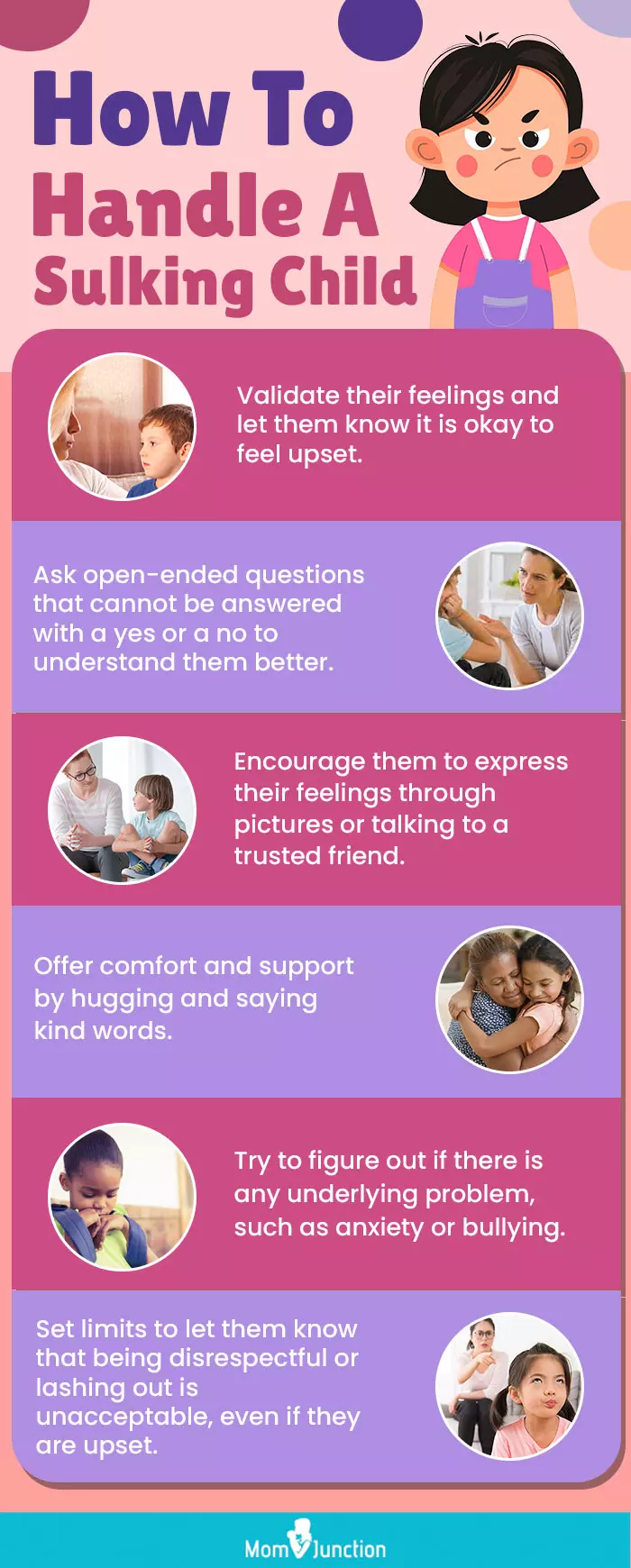
Illustration: Helpful Tips To Deal With A Sulking Child
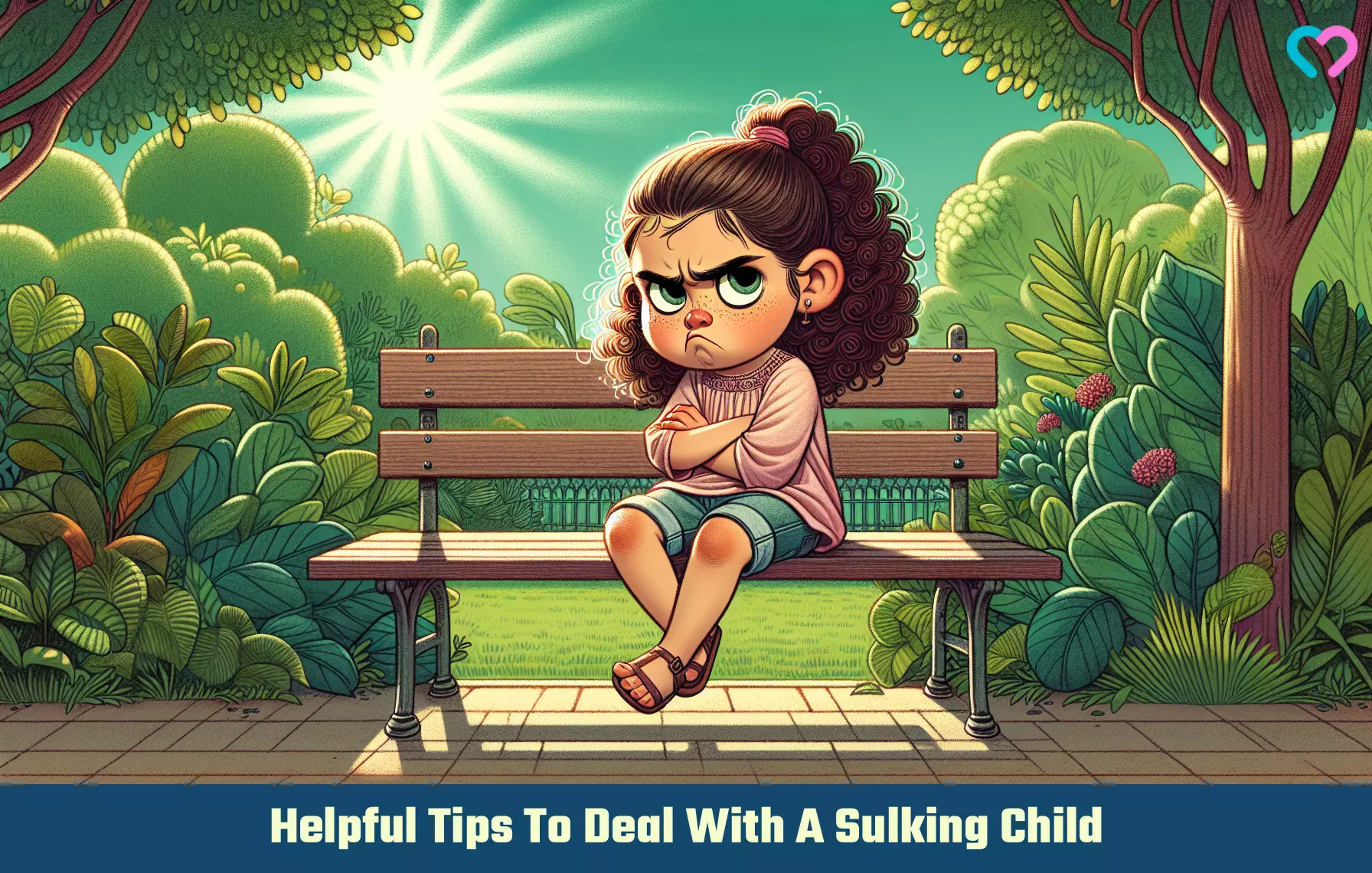
Image: Dall·E/MomJunction Design Team
Personal Experience: Source
MomJunction articles include first-hand experiences to provide you with better insights through real-life narratives. Here are the sources of personal accounts referenced in this article.
i. Dealing with a sulking child? Use the power of art;https://medium.com/new-writers-welcome/dealing-with-a-sulking-child-use-the-power-of-art-4675085000ec
References
- Why Is It Important to Read to Your Child?
https://childmind.org/article/why-is-it-important-to-read-to-your-child/#:~:text=It%20exposes%20them%20to%20newhow%20to%20handle%20challenging%20feelings. - The Benefits of Watching TV With Young Children.
https://childmind.org/article/benefits-watching-tv-young-children/#:~:text=When%20it%20comes%20to%20educational%20shows%20like%20Sesame%20Street%2C%20theanswering%20their%20questions)%20increases%20learning.
Community Experiences
Join the conversation and become a part of our nurturing community! Share your stories, experiences, and insights to connect with fellow parents.
Read full bio of Dr. Neema Shrestha
Read full bio of Debolina Raja
Read full bio of Harshita Makvana
Read full bio of Apoorva K












